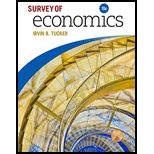
The meaning of scarcity.
Answer to Problem 1KC
Option 'e' is correct.
Explanation of Solution
Scarcity is obviously shortage. The shortage of supply to the existing
Option (e):
Human wants are unlimited, and there are no limits to the wants of the consumers. But the resources to meet human wants are limited, which means that there is scarcity of resources in the economy. The available scarce resources have many alternative uses that make choices for the consumers. Thus, scarcity forces the individuals to choose between the available choices. This indicates that option 'e' is correct.
Option (a):
Scarcity arises when the wants are more than the supply. This means when the supply of anything from money to goods and services are lower than the demand, there arises scarcity. Thus, when there is scarcity, not all the wants can be satisfied because the scarce resources have alternative uses. This makes option 'a' incorrect.
Option (b):
The consumers are free to choose between the alternative uses of the scarce resources and are not forced to accept one, which means that there is no abandoning of the consumer sovereignty. This means that option 'b' is also incorrect.
Option (c):
Scarcity arises when the wants are higher than the supply. The resources are having alternative uses and when the consumers lie about their wants, they cannot get the wants fulfilled, and this means that they would never lie about the wants, and so, option 'c' is incorrect.
Option (d):
The resources are limited, whereas the human wants are limited, and this makes scarcity in the economy. Thus, humans cannot make the unlimited resources because it is naturally formed. This means that option 'd' is incorrect.
Scarcity: The term “scarcity” defines the situation where the supply of something in the economy is lower than the required demand in the economy, which is obviously known as shortage.
Want to see more full solutions like this?
- How Command Economics Relate to Principle Of Economics?arrow_forwardhow commond economies relate to principle Of Economics ?arrow_forwardCritically analyse the five (5) characteristics of Ubuntu and provide examples of how they apply to the National Health Insurance (NHI) in South Africa.arrow_forward
- Critically analyse the five (5) characteristics of Ubuntu and provide examples of how they apply to the National Health Insurance (NHI) in South Africa.arrow_forwardOutline the nine (9) consumer rights as specified in the Consumer Rights Act in South Africa.arrow_forwardIn what ways could you show the attractiveness of Philippines in the form of videos/campaigns to foreign investors? Cite 10 examples.arrow_forward
- Explain the following terms and provide an example for each term: • Corruption • Fraud • Briberyarrow_forwardIn what ways could you show the attractiveness of a country in the form of videos/campaigns?arrow_forwardWith the VBS scenario in mind, debate with your own words the view that stakeholders are the primary reason why business ethics must be implemented.arrow_forward
- The unethical decisions taken by the VBS management affected the lives of many of their clients who trusted their business and services You are appointed as an ethics officer at Tyme Bank. Advise the management regarding the role of legislation in South Africa in providing the legal framework for business operations.arrow_forwardTyme Bank is a developing bank in South Africa and could potentially encounter challenges similar to those faced by VBS in the future. Explain five (5) benefits of applying business ethics at Tyme Bank to prevent similar ethical scandals.arrow_forward1.3. Explain the five (5) ethical challenges that can be associated with the implementation of the National Health Insurance (NHI) in South Africa.arrow_forward



